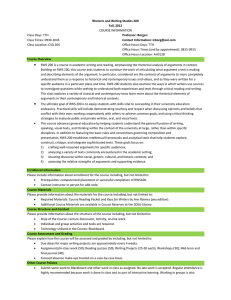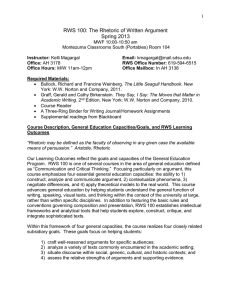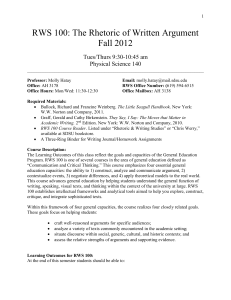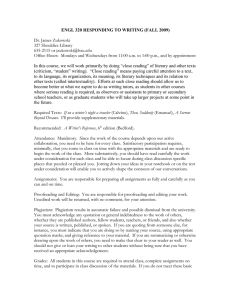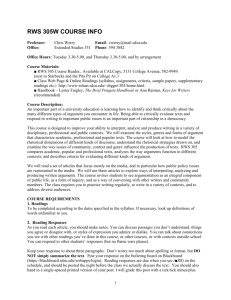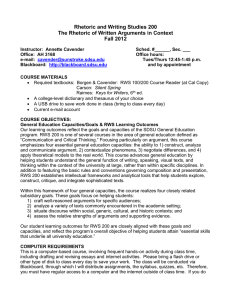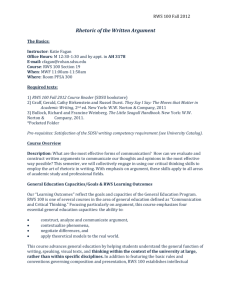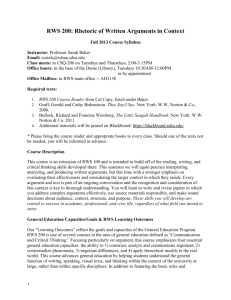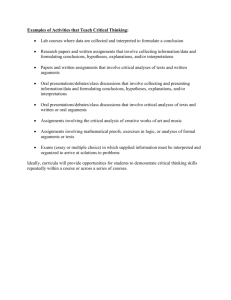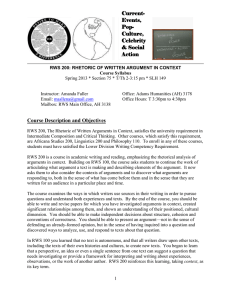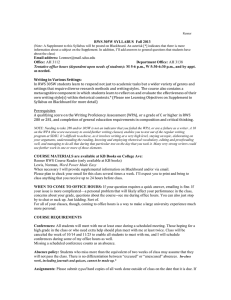RWS 200: Rhetoric of Written Arguments in Context
advertisement
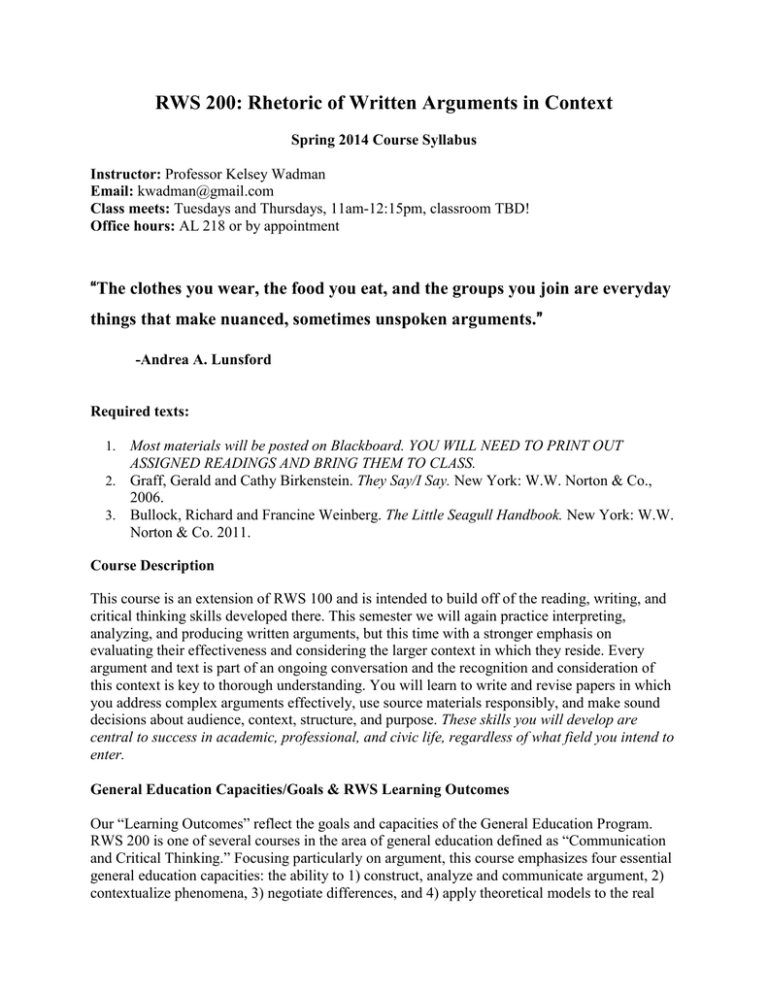
RWS 200: Rhetoric of Written Arguments in Context Spring 2014 Course Syllabus Instructor: Professor Kelsey Wadman Email: kwadman@gmail.com Class meets: Tuesdays and Thursdays, 11am-12:15pm, classroom TBD! Office hours: AL 218 or by appointment “The clothes you wear, the food you eat, and the groups you join are everyday things that make nuanced, sometimes unspoken arguments.” -Andrea A. Lunsford Required texts: Most materials will be posted on Blackboard. YOU WILL NEED TO PRINT OUT ASSIGNED READINGS AND BRING THEM TO CLASS. 2. Graff, Gerald and Cathy Birkenstein. They Say/I Say. New York: W.W. Norton & Co., 2006. 3. Bullock, Richard and Francine Weinberg. The Little Seagull Handbook. New York: W.W. Norton & Co. 2011. 1. Course Description This course is an extension of RWS 100 and is intended to build off of the reading, writing, and critical thinking skills developed there. This semester we will again practice interpreting, analyzing, and producing written arguments, but this time with a stronger emphasis on evaluating their effectiveness and considering the larger context in which they reside. Every argument and text is part of an ongoing conversation and the recognition and consideration of this context is key to thorough understanding. You will learn to write and revise papers in which you address complex arguments effectively, use source materials responsibly, and make sound decisions about audience, context, structure, and purpose. These skills you will develop are central to success in academic, professional, and civic life, regardless of what field you intend to enter. General Education Capacities/Goals & RWS Learning Outcomes Our “Learning Outcomes” reflect the goals and capacities of the General Education Program. RWS 200 is one of several courses in the area of general education defined as “Communication and Critical Thinking.” Focusing particularly on argument, this course emphasizes four essential general education capacities: the ability to 1) construct, analyze and communicate argument, 2) contextualize phenomena, 3) negotiate differences, and 4) apply theoretical models to the real world. This course advances general education by helping students understand the general function of writing, speaking, visual texts, and thinking within the context of the university at large, rather than within specific disciplines. In addition to featuring the basic rules and conventions governing composition and presentation, RWS 200 establishes intellectual frameworks and analytical tools that help students explore, construct, critique, and integrate sophisticated texts. Within this framework of four general capacities, the course realizes four closely related subsidiary goals. These goals focus on helping students: 1. craft well-reasoned arguments for specific audiences; 2. analyze a variety of texts commonly encountered in the academic setting; 3. situate discourse within social, generic, cultural, and historic contexts; and 4. assess the relative strengths of arguments and supporting evidence. Our student learning outcomes for RWS 200 are closely aligned with these goals and capacities, and reflect the program’s overall objective of helping students attain “essential skills that underlie all university education.” Assignments Our class will achieve the goals and outcomes through texts that present issues relevant to the San Diego region. We will split our class into 3 Units. In Unit 1 we will jumpstart a discussion about SeaWorld, animal rights and activism, human safety and government intervention, and ethics by watching the film Blackfish and examining subsequent texts on subjects brought to light by the film. We’ll finish Unit 1 with a paper. In Unit 2 we will read a series of texts about the Kumeyaay- the indigenous peoples of San Diego. We will examine some of the arguments made about important issues surrounding the Kumeyaay. The main assignments for Unit 2 are a paper and a group presentation. We will round out the class with Unit 3, broadening our subject matter to discussing various aspects of San Diego identity. You will write a final paper and do an individual presentation. Readings and Discussion: You will read a lot for this class! Since this class has an emphasis on context, consulting many sources is important. You are expected to read actively- that is, read carefully and thoroughly and be prepared to discuss the text in class. I will start giving reading quizzes if students are not doing their readings. Papers: You will be required to write 3 essays for this course, one for each of the three units. All pre-writing, rough drafts, and final drafts are due in-class and/or on Blackboard TurnItIn on the date specified. Specific criteria for each essay will be given along with the prompt. Presentations: You will do 2 presentations, a group presentation during Unit 2 and an individual presentation during Unit 3. Presentations will have an emphasis on providing context on an argument to your class, and will include bringing handouts to distribute to your classmates. Conferences/Peer Review: Rough drafts, peer reviewing, and rewriting will be required for writing assignments. For units 1 and 2 you will sign up for a 10-15 minute one-on-one conference time with me to review your draft. You will also peer review prior to turning in your final draft. Participation: You are expected to participate actively in class. This is a discussion-based class and your voice is essential! POLICIES ATTENDANCE: There is no substitute for attending class. If you are absent you are still responsible for knowing what was covered in class, what the homework is, and when it is due. I suggest you exchange phone numbers and/or emails with at least two of your classmates. In addition, check Blackboard regularly. Students are allowed no more than 3 absences during the semester. Missing more than 3 classes will result in a reduction in the class attendance/participation grade. I will mark down excessive tardiness (arriving more than 5 minutes late to class) on my attendance sheet. Please note: two tardies are equivalent to one absence. BLACKBOARD: Students should go to https://blackboard.sdsu.edu to access all important information required of this class, such as YouTube videos, class assignments, readings, and this syllabus. ELECTRONICS: Your active participation is required in this course and I do not allow the use of laptops, iPads, or others during class. Please turn off your cell phones, iPods, and other electronic equipment. RESPECT: During this course, we will be covering controversial and debatable subjects. Since this is a discussion-based class, it is vital that you listen and speak respectfully to others at all times. Discriminatory and disrespectful remarks will not be tolerated. I encourage you to express your opinions, of course – they will often inspire good discussions—but please do so consciously with tact and professionalism. PLAGIARISM: It is never ok. All work in this course must be original; academic integrity is expected at all times. Plagiarism in any class will result in serious consequences ranging from grade reduction to failure in the class to expulsion from the college. The university catalog describes plagiarism as follows: “Plagiarism is formal work publicly misrepresented as original; it is any activity wherein one person knowingly, directly, and for lucre, status, recognition, or any public gain resorts to the published or unpublished work of another in order to represent it as one’s own. Work shall be deemed plagiarism: (1) when prior work of another has been demonstrated as the accessible source; (2) when substantial or material parts of the source have been literally or evasively appropriated (substance denoting quantity; matter denoting qualitative format or style); and (3) when the work lacks sufficient or unequivocal citation so as to indicate or imply that the work was neither a copy nor an imitation. This definition comprises oral, written, and crafted pieces. In short, if one purports to present an original piece but copies ideas word for word or by paraphrase, those ideas should be duly noted.” (from SDSU General Catalog 2009-2010. San Diego State University, 2009: 455) For more information on the university cheating and plagiarism policy, please visit: http://wwwrohan.sdsu.edu/dept/senate/ policy/pfacademics.html. SDSU’s library also has an excellent tutorial on how to avoid plagiarism. COURSE ASSISTANCE SERVICES OFFICE HOURS: I encourage all students to attend office hours, especially if you have any questions or concerns about reading, writing, the course or college in general. If you need assistance but cannot make it to office hours, please email me and we can try to schedule an appointment. DISABLED STUDENTS: Every attempt will be made to offer reasonable accommodations for students with disabilities in this course. If you have an outstanding medical issue which may affect your performance in this course or require special accommodations, please notify me privately as soon as possible, before assignments are due. Students with disabilities who may need accommodations in this class are also encouraged to contact Student Disability Services (SDS) as soon as possible. All discussion of disabilities will take place privately to protect student confidentiality. SDS staff are available in the Capulli Center in Suite 3101 or by phone at (619) 594-6473 (voice) or (619) 594-2929 (TTD/TTY). COUNSELING: There are many events and situations that put additional stress on being a student. SDSU has an excellent center for Counseling & Psychological Services that is open to students Monday through Friday from 8am-4:30pm. To set up an initial consultation, call (619) 594-5220. For immediate or emergency help, you are welcome to use San Diego’s free 24-hour counseling access line at (800) 479-3339. C&PS on campus also has a “Center for Well-Being” with multiple stations for relaxation if you are feeling stressed. C&PS is located in the Capulli Center, Room 4401. STUDENT-ATHLETES: Student-athletes have very demanding, dynamic schedules which place additional hardship on excelling in both arenas. As an instructor, I am committed to helping you succeed in the course. To do so, regular and effective communication is needed. While no exceptions will be made for attendance, assignment deadlines, or exams, I would be happy to work with all student-athletes in conjunction with Student-Athlete Support Services (SASS) to help you excel in this course. For more information on SASS’ academic advising and tutoring services, call (619) 594-4743. GRADES Paper #1 Group Presentation Paper #2 Individual Presentation 15% 10% 20% 10% Paper #3 Homework assignments, etc. Attendance/Participation GRADING RUBRIC Letter Grade Percentile A……………………….100-94% A-………………………93-90% B+………………………89-87% B………………………..86-84% B-……………………….83-80% C+……………………..79-77% C……………………….76-74% C-………………………73-70% D……………………….69-60% F………………………..60% 20% 10% 15%
